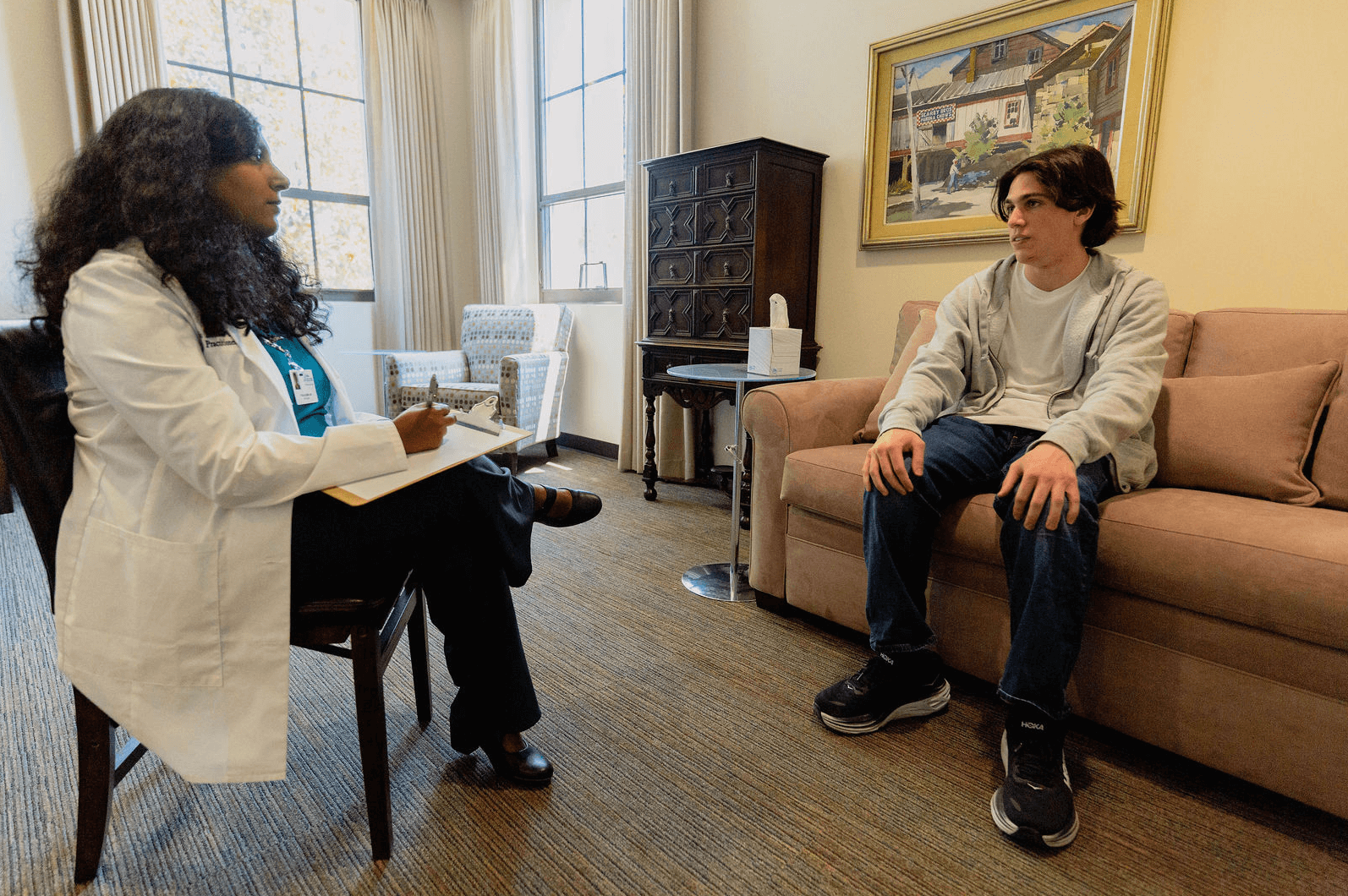
Discover the Benefits of a Nursing Degree From USD
The information in this blog post is for informational purposes only and is not intended to replace medical, financial, or professional advice.
It’s estimated that one in five U.S. adults experience mental illness each year, affecting millions across the country. Among youth, one in six children ages 6 to 17 face a mental health disorder annually. Yet despite these staggering numbers, only 47.2% of adults receive treatment.
This is where psychiatric mental health nurse practitioners (PMHNPs) play a crucial role. As leaders in mental health care, PMHNPs possess specialized knowledge of mental illnesses and psychiatric treatments, ensuring patients across all healthcare settings receive the support they need to live happy, healthy lives.
Whether you’re interested in working in mental health services or curious about career options with a nursing doctorate, becoming a PMHNP could be the perfect fit for you.
What Is a PMHNP?
A psychiatric mental health nurse practitioner is an advanced practice nurse who specializes in mental health care. They assess, diagnose, and treat psychiatric conditions, taking a holistic approach that considers both mental and physical health. PMHNPs work both independently and collaboratively as part of healthcare teams to ensure patients from all backgrounds receive comprehensive, compassionate care.
While PMHNPs share many core responsibilities with other nurse practitioners, they also bring unique expertise that makes them essential to a well-rounded healthcare system. Their specialized training in mental health enables them to support patients with complicated mind-body needs and contribute to evolving best practices in treating mental illness.
Differences Between a Psychiatric Nurse Practitioner vs. a Psychiatrist
At first glance, the roles of psychiatric nurse practitioner and psychiatrist may seem interchangeable. While both professionals care for individuals with mental health needs, there are several key differences between the two careers.
PMHNPs are advanced practice registered nurses who hold a master’s or doctoral degree in nursing with a psychiatric concentration, along with relevant clinical experience. Psychiatrists, on the other hand, are medical doctors (MD or DO) who complete medical school followed by a four-year psychiatry residency. This medical training gives psychiatrists a broader scope of practice, particularly in complex diagnostic and pharmacological cases.
In terms of certification, PMHNPs must obtain the Psychiatric-Mental Health Nurse Practitioner (Across the Lifespan) Certification and a nurse practitioner state license, while psychiatrists are board certified by the American Board of Psychiatry and Neurology and licensed as physicians. PMHNPs are more likely to work in hospital-based mental health clinics or community settings, while psychiatrists often operate in private practice. Salary also varies widely, with psychiatrists earning a significantly higher average income than PMHNPs.
Here’s a side-by-side comparison of both roles:
| Psychiatric Nurse Practitioner |
Psychiatrist |
|
| Role overview | Assess, diagnose, and treat mental health conditions, provide psychotherapy and counseling, prescribe medication, educate and create mental health resources for families | Assess, diagnose, and treat mental health conditions, provide psychotherapy and counseling, prescribe medication |
| Required education and experience |
Master’s or doctorate in nursing with a psychiatric nurse concentration; two years of work experience | Doctor of medicine (MD) or doctor of osteopathic medicine (DO) ; four years of psychiatric residency |
| Certifications |
Psychiatric Mental Health Nurse Practitioner Across the Lifespan Certification (PMHNP-BC) and Nurse Practitioner State License | Board certification from the American Board of Psychiatry and Neurology and Medical Doctor State License |
| Practice setting |
Outpatient clinics, correctional facilities, addiction treatment centers, and inpatient hospitals; more likely to work in a hospital or mental health clinic than a psychiatrist | Outpatient clinics, correctional facilities, addiction treatment centers, inpatient hospitals; more likely to work in private practice than an NP |
| Average salary range |
$120,500–$154,000 | $212,000–$317,000 |
A Day in the Life of a PMHNP
Psychiatric mental health nurse practitioners are compassionate, emotionally intelligent professionals who play a vital role in mental healthcare. Their responsibilities can vary depending on the setting. In hospitals and doctors’ offices, PMHNPs often support psychiatrists and physicians by performing assessments, monitoring patient needs, and tracking progress. In mental health clinics or private practices, they may take on more independent roles such as diagnosing and treating patients directly.
Regardless of where they work, one thing remains consistent: PMHNPs are confident, efficient, and empathetic leaders dedicated to improving mental health outcomes.
While day-to-day duties can shift based on your employer, clinical setting, and patient population, most PMHNPs can expect to engage in the following activities during a typical workday:
- Conduct comprehensive patient evaluations
- Prescribe and manage psychiatric medications
- Provide individual, group, or family psychotherapy
- Collaborate with interdisciplinary care teams
- Document patient progress and update treatment plans
- Address urgent patient concerns or crises as needed
- Meet regularly with patients for follow-up care
- Educate and support patients and their families
- Stay current on research and evidence-based best practices
- Participate in end-of-day team debriefs, when applicable
Specialities Available to Pursue as a PHMNP
Given the wide range of conditions and populations they serve, PMHNPs have a broad scope of practice. Some specialize in providing psychotherapy to individuals, families, or groups. Others may focus on care coordination within interdisciplinary teams or take a holistic approach by evaluating both psychiatric and non-psychiatric health needs.
Some PMHNP specializations require additional training and certification. Here are three common title specializations within the field:
- Child and adolescent PMHNP: These specialists work with children and teens experiencing psychiatric, behavioral, and learning disorders. They assess, diagnose, and treat conditions such as ADHD, autism, depression, anxiety, and eating disorders.
- Geriatric PMHNP: NPs in this area support older adults and their families through the challenges of aging. They often treat age-related mental health concerns such as depression, anxiety, grief, and fear of death, as well as cognitive conditions such as Alzheimer’s disease.
- Addiction disorder PMHNP: These professionals diagnose and treat a wide range of addictive behaviors, including those related to drugs, alcohol, gambling, or food. In addition to typical PMHNP settings, they may work in addiction recovery centers, detox facilities, outpatient programs, and transitional housing.
How Much Does a PMHNP Make?
Salaries for this role will vary based on employer, responsibilities, desired qualifications, and location, but the average range is around $120,500–$154,000. According to ZipRecruiter, PMHNPs in California earn an average of $137,000.
Career Outlook for PMHNPs
Mental health awareness continues to grow, leading to a greater demand for qualified mental health professionals, including psychiatric-mental health nurse practitioners. As more people recognize the importance of mental wellness and seek professional care for mental health conditions, the need for PMHNPs increases.
While the U.S. Bureau of Labor Statistics (BLS) doesn’t provide data specific to PMHNPs, it does track nurse practitioners as a whole. Employment for NPs is projected to grow by 40% from 2023 to 2033, which is much faster than the average for all occupations.
How to Become a Psychiatric Mental Health Nurse Practitioner
Becoming a PMHNP involves a combination of experience, education, and certification. Here’s a step-by-step overview of the process:
- Earn a nursing degree. You’ll first need to complete a nursing education program that qualifies you to become a nurse. Common pathways include an Associate Degree in Nursing (ADN), Bachelor of Science in Nursing (BSN), an accelerated BSN (for those who already hold a bachelor’s degree in another field), and a direct-entry master’s degree program, which is designed for individuals with a non-nursing undergraduate degree.
- Pass the NCLEX-RN and become a licensed RN. After earning your degree, you must pass the NCLEX-RN exam to obtain your RN license and begin practicing.
- Gain clinical experience. While some PMHNP programs accept new nurses, most prefer or require applicants to have several years of clinical nursing experience.
- Enroll in a PMHNP graduate program. The next step is to earn an advanced nursing degree that focuses on psychiatric-mental health. You can choose from a Master of Science in Nursing (MSN) or a Doctor of Nursing Practice (DNP), both of which offer a psychiatric-mental health focus and both of which prepare you to sit for the national certification and practice as a PMHNP. A graduate program also includes supervised clinical hours.
- Pass the national certification exam. After earning your graduate degree, you’ll need to pass the Psychiatric-Mental Health Nurse Practitioner (Across the Lifespan) Certification exam, which is administered by the American Nurses Credentialing Center (ANCC).
How a DNP Prepares You for a Career as PMHNP
Earning a DNP is becoming an increasingly popular, and often preferred, option for nurses who want to enter advanced psychiatric practice with a strong foundation in leadership, clinical expertise, and evidence-based care. DNP programs prepare students for direct patient care but also roles in administration, advocacy, education, and mental health policy. A DNP program:
- Provides advanced clinical training in psychiatric assessment, diagnosis, and treatment planning
- Equips you with the skills to deliver psychotherapy and manage psychopharmacology
Prepares you to work independently or in leadership roles within integrated mental health care teams - Emphasizes evidence-based practice and quality improvement to enhance patient outcomes
- Meets the educational requirement to sit for PMHNP certification
Ready to Take the Next Step Toward Becoming a PMHNP?
The University of San Diego Hahn School of Nursing and Health Science offers one of the most comprehensive PMHNP programs in California. Whether you’re pursuing a
Masters of Science in Nursing or enrolling in the BSN to DNP program, you’ll find a dedicated psychiatric mental health nurse practitioner track designed to meet you where you are in your nursing journey.
Our PMHNP curriculum blends rigorous academic training with hands-on clinical experience, preparing you to deliver confident, compassionate care to patients of all backgrounds.
At USD, we empower nurses to lead in the healthcare world. If you're ready to specialize in psychiatric mental health and elevate your impact in the field, we invite you to learn more to request more information about our programs today.
To explore the program details and see how USD can support your goals, download our comprehensive DNP Program Guide today.
FAQs
How long does it take to become a PMHNP?
It typically takes six to eight years to become a psychiatric-mental health nurse practitioner, but this may vary depending on your starting point and chosen educational path. This timeline includes earning a BSN, becoming a licensed registered nurse, gaining clinical experience, and completing a graduate-level nursing program.
Can PMHNPs prescribe medication?
Yes, PMHNPs can prescribe medication, including psychotropic medications used to treat mental health conditions. However, prescriptive authority varies by state. In full-practice states, PMHNPs can prescribe medications independently, without physician oversight. In reduced or restricted practice states, they may be required to collaborate with or be supervised by a physician to prescribe certain medications.
Where can you work as a PMHNP?
PMHNPs typically work in outpatient clinics, correctional facilities, addiction treatment centers, and inpatient hospitals. They are more likely to work in a hospital or mental health clinic than a psychiatrist.
What’s the difference between a PMHNP and a clinical psychologist?
Both positions provide mental health care, but their education, scope of practice, and approach to treatment are quite different. A clinical psychologist holds a PhD or PsyD in psychology and typically cannot prescribe medication, except in a few states. Their primary focus is on psychological assessments, diagnosing mental health conditions, and providing talk therapy. While they may discuss medication options with patients, they usually refer out to a psychiatrist or PMHNP for medication management. Clinical psychologists work in settings such as mental health clinics, private practices, schools, hospitals, and research institutions.
Is it better to get a DNP or an MSN as a PMHNP?
It depends on your career goals, timeline, and professional interests. Both degrees qualify you to become a PMHNP, but there are some key differences. An MSN program is typically shorter and more affordable, making it a great option if you want to start practicing sooner. A DNP, on the other hand, is ideal if you’re aiming for roles in leadership, policy, education, or if you’re seeking the highest level of clinical training in nursing practice.
The information provided by USD’s Hahn School of Nursing and Health Science is for informational purposes only and is not intended to replace professional medical or financial advice. This includes, but is not limited to, blog posts, eBooks, webinars, emails, graphics, social media posts, and other content. Always seek the guidance of your physician or a qualified medical or financial professional.
A Guide to the University of San Diego's Adult-Gerontology Clinical Nurse Specialist Program
The University of San Diego's nursing program ranks among the best in the nation. But that's not the only reason future students walk through our doors to pursue one of our graduate degrees. Download our guide for an in-depth look at the Adult-Gerontology Clinical Nurse Specialist program and learn how our rich heritage of excellence in nursing education can help you achieve your academic and professional goals.
GET THE GUIDE







